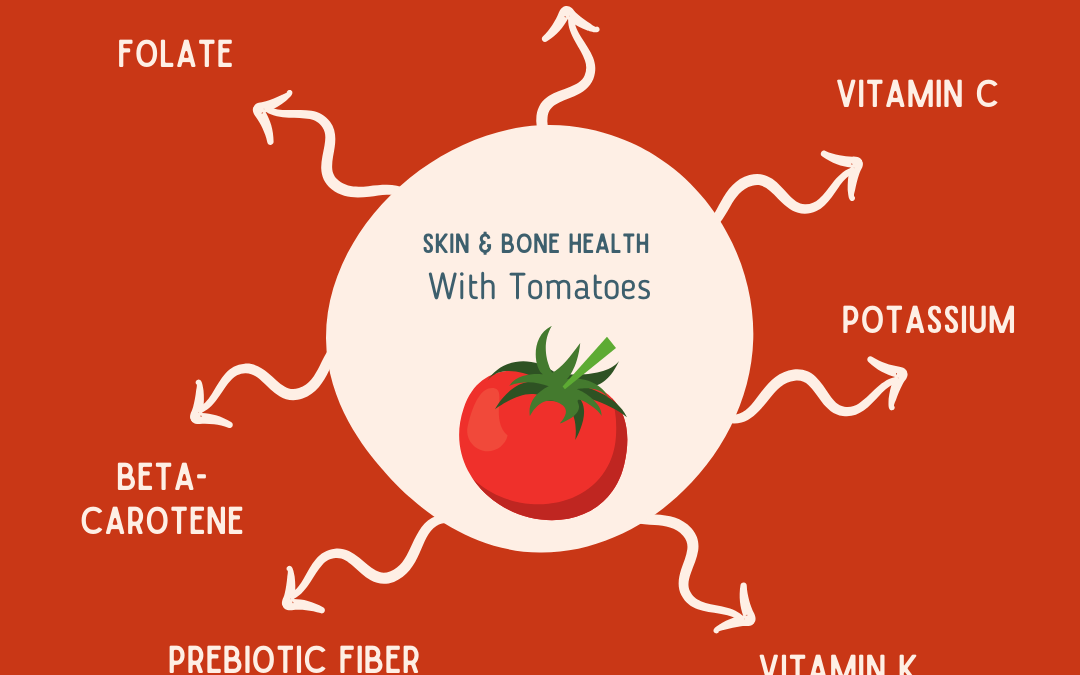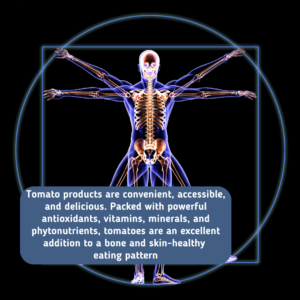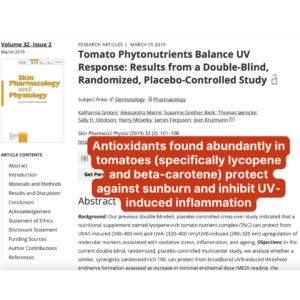Nourish Skin, Strengthen Bones—With Tomatoes!
Introduction: The Foundation of Health – Skin and Bones
Healthy skin and bones are essential pillars of overall well-being. Our skin acts as the body’s first line of defense, shielding us from external harm while regulating temperature and preventing water loss.1,2 Meanwhile, strong bones provide the structural framework that supports our body, enabling movement, protecting internal organs, and storing essential minerals like calcium and phosphorus.3,4
 Maintaining the health of these two systems is critical. Healthy skin promotes confidence and prevents conditions like dryness, acne, or infections.1 Strong bones, on the other hand, reduce the risk of fractures and debilitating diseases like osteoporosis.3,4 Lifestyle choices, including diet, play a significant role in keeping these systems thriving, and one surprising ally in this journey is tomato products.
Maintaining the health of these two systems is critical. Healthy skin promotes confidence and prevents conditions like dryness, acne, or infections.1 Strong bones, on the other hand, reduce the risk of fractures and debilitating diseases like osteoporosis.3,4 Lifestyle choices, including diet, play a significant role in keeping these systems thriving, and one surprising ally in this journey is tomato products.
Nutrients in Tomato Products that Promote Skin and Bone Health
Tomatoes, whether fresh, canned, or in processed forms like sauces and pastes, are nutrient powerhouses that contribute to both skin and bone health. Here’s a closer look at their key components:
- Lycopene
Lycopene, a powerful antioxidant responsible for the red hue of tomatoes, is particularly beneficial for skin health. It helps neutralize free radicals that damage skin cells, reducing signs of aging and protecting against UV-induced harm.5,6 Studies suggest carotenoids, like lycopene, also support skin elasticity and hydration, and protect against DNA damage associated with skin cancer.5-7For bones, lycopene’s antioxidant properties help combat oxidative stress, which can lead to bone weakening. By reducing inflammation, lycopene contributes to maintaining bone density. (a,d) Additional studies show that lycopene may promote bone growth and inhibit breakdown of bone, helping to maintain strong bones.8 - Vitamin C
Tomato products are a rich source of vitamin C, a vital nutrient for collagen synthesis. Collagen is the main structural protein in skin and bones, promoting elasticity in the former and strength in the latter.1,9 - Vitamin K
Often overlooked, vitamin K plays a crucial role in bone mineralization. It helps regulate calcium deposition, ensuring that calcium is utilized effectively for bone strength.9 Tomato products like sauces and pastes retain this vital nutrient, making them an easy addition to a bone-healthy diet. - Potassium
Tomatoes are packed with potassium, a mineral that helps maintain skin hydration and elasticity by balancing fluid levels in cells.5 For bones, potassium helps balance body pH, which helps reduce the excretion of calcium through urine, preserving bone mineral density. - Beta-Carotene
Another antioxidant in tomatoes, beta-carotene, is converted into vitamin A in the body.4,6 This nutrient protects skin cells against damaging UV rays.1,2,7 In bone, beta-carotene has been associated with enhanced mineralization of bone and upregulation of bone formation pathways.4
Additional Benefits of Processed Tomato Products for Skin and Bone Health
Processed tomato products are more than just a pantry staple; they can enhance the nutritional benefits of tomatoes, especially when it comes to promoting healthy skin and strong bones. Here’s why processed tomato products deserve special attention:
1. Increased Lycopene Bioavailability: The processing of tomatoes, such as cooking or canning, increases the bioavailability of lycopene. This means your body can absorb and use lycopene—a potent antioxidant—even more effectively.3,7 For skin, this results in greater protection against UV damage and oxidative stress, both of which contribute to aging and dullness. For bones, higher lycopene levels help combat oxidative stress and inflammation, which are linked to bone loss.
2. Prebiotic Support for the Skin and Bone Microbiomes: Some processed tomato products, particularly those with natural fibers, act as prebiotics. A healthy gut microbiome is linked to better nutrient absorption, including calcium and vitamin D, which are crucial for bone strength. A thriving microbiome also contributes to a balanced skin microbiome, reducing inflammation and improving skin health.1,10
3. Convenience for Consistency: Processed tomato products are quick and easy to use, encouraging regular consumption of these skin- and bone-supporting nutrients. Whether in a sauce, soup, or paste, they make it easier to include protective antioxidants and minerals in your daily meals, supporting consistent care for your skin and bones.
4. Affordable Year-Round Nutrition for Skin and Bones: Processed tomato products provide an economical and accessible way to nourish your skin and bones throughout the year. Unlike fresh tomatoes, which are seasonal and can be costly, canned or jarred options are budget-friendly and readily available.
Conclusion: The Tomato Advantage
Tomato products are not just convenient and flavorful but also packed with nutrients that support the health of your skin and bones. By incorporating them into your diet, you’re nourishing your body with antioxidants, vitamins, and minerals that keep you looking and feeling your best. Whether it’s a vibrant tomato sauce or a comforting bowl of tomato soup, embracing the tomato’s versatility can be a simple yet effective step towards long-term wellness.
References:
- Woodby B, Penta K, Pecorelli A, Lila MA, Valacchi G. Skin Health from the Inside Out. Annu Rev Food Sci Technol. 2020 Mar 25;11:235-254. doi: 10.1146/annurev-food-032519-051722. Epub 2020 Jan 6. PMID: 31905017.
- Schagen SK, Zampeli VA, Makrantonaki E, Zouboulis CC. Discovering the link between nutrition and skin aging. Dermatoendocrinol. 2012;4(3):298-307. doi:10.4161/derm.22876
- Walallawita US, Wolber FM, Ziv-Gal A, Kruger MC, Heyes JA. Potential Role of Lycopene in the Prevention of Postmenopausal Bone Loss: Evidence from Molecular to Clinical Studies. Int J Mol Sci. 2020;21(19):7119. Published 2020 Sep 27. doi:10.3390/ijms21197119
- Faienza MF, Giardinelli S, Annicchiarico A, et al. Nutraceuticals and Functional Foods: A Comprehensive Review of Their Role in Bone Health. Int J Mol Sci. 2024;25(11):5873. Published 2024 May 28. doi:10.3390/ijms25115873
- Collins EJ, Bowyer C, Tsouza A, Chopra M. Tomatoes: An Extensive Review of the Associated Health Impacts of Tomatoes and Factors That Can Affect Their Cultivation. Biology (Basel). 2022;11(2):239. doi:10.3390/biology11020239
- Groten K, Marini A, Grether-Beck S, et al. Tomato Phytonutrients Balance UV Response: Results from a Double-Blind, Randomized, Placebo-Controlled Study. Skin Pharmacol Physiol. 2019;32(2):101-108. doi:10.1159/000497104
- Strouphauer E, Parke M, Perez-Sanchez A, Tantry E, Katta R. Functional Foods in Dermatology. Dermatol Pract Concept. 2023;13(4):e2023256. doi:10.5826/dpc.1304a256
- Costa-Rodrigues J, Fernandes MH, Pinho O, Monteiro PRR. Modulation of human osteoclastogenesis and osteoblastogenesis by lycopene. J Nutr Biochem. 2018 Jul;57:26-34. doi: 10.1016/j.jnutbio.2018.03.004. Epub 2018 Mar 15. PMID: 29655028.
- Campbell BJ. Calcium, Nutrition, and Bone Health. The American Academy of Orthopedic Surgeons. Reviewed August 2021. Accessed January 6, 2025. https://orthoinfo.aaos.org/en/staying-healthy/calcium-nutrition-and-bone-health/
- Hadadi N, Berweiler V, Wang H, Trajkovski M. Intestinal microbiota as a route for micronutrient bioavailability. Curr Opin Endocr Metab Res. 2021 Sep 4;20:100285. doi: 10.1016/j.coemr.2021.100285.



Recent Comments